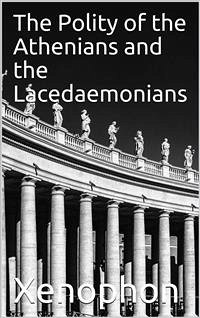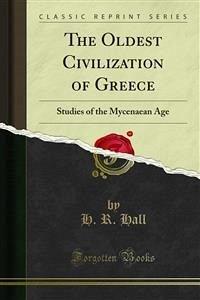Xenophon the Athenian was born 431 B.C. He was a pupil of Socrates. He marched with the Spartans, and was exiled from Athens. Sparta gave him land and property in Scillus, where he lived for many years before having to move once more, to settle in Corinth. He died in 354 B.C. The Lacedaemonion Politeia, known in English as the Polity, Constitution, or Republic of the Lacedaemonians, or the Spartan Constitution, is a treatise attributed to the ancient Greek philosopher Xenophon, describing the institutions, customs, and practices of the ancient Spartans. The work examines the reasons for Sparta's power and renown, despite the city state's sparse population. There are fifteen chapters: the first thirteen enumerate the practices and institutions that made Sparta great; the last two describe Sparta's decline and the survival of its monarchy. The Polity dates to the period between 387 and 375 BC, and is the only contemporary account of the Spartan political system which survives. Together with Plutarch's "Life of Lycurgus", it provides the most detailed surviving description of the Spartan state, and is considered the best source of information about Spartan women during classical antiquity. The work consists of fifteen chapters, numbered I to XV. In the first thirteen chapters, Xenophon examines the attributes of the Spartan state that contributed to making Sparta such a powerful and renowned city in ancient Hellas. The last two chapters diverge from that focus and concentrate instead on the decline of Sparta, and then on the survival of the monarchy in the declining state. In Chapter I Xenophon enumerates the parenting methods used by the Spartans to create strong children. Chapters II–IV describe the education of the Spartan children as a lifelong process that starts when they are very young and continues into adulthood. Xenophon explains how this educational process produces humble and law-abiding citizens who at the same time can be daring and ingenious. He also mentions that the Spartans practiced hunting for most of their lives. Chapter V describes the Spartan institutions that produce citizens who are moderate in their habits, possess good public manners, and are physically strong through regular exercise. Chapter VI explains Spartan egalitarianism, and Spartans' indifference to economic status, as well as their willingness to help those of lesser means. Chapter VII discusses the Spartans' utter disregard for money, their keen interest in civic duty, and their commitment to the freedom of Sparta. Chapter VIII describes the Spartans' deference and obedience to their laws and authorities, and the power of the Spartan government to administer justice. Chapter IX refers to the Spartan sense of honour, which compelled them to prefer an honourable death in battle to surrendering. Chapter X details how Spartan society promotes good citizenship though public awards, while Chapters XI to XIII detail Spartan military strategy, leadership, and ethos. In Chapter XIV, Xenophon changes direction, and instead of further explaining the things that made Sparta great, he enumerates how the contemporary state of Sparta has become corrupt, and no longer obeys the laws of Lycurgus. In the same chapter, Xenophon further explains how this decline in Spartan morals and prestige has caused the other Greek states to no longer look up to Sparta for leadership, but instead to team up against Sparta to prevent it from ruling over the rest of Greece. In Chapter XV, Xenophon ends by telling how, despite its decline, the city state has remained faithful to the institution of the king.
Bitte wählen Sie Ihr Anliegen aus.
Rechnungen
Retourenschein anfordern
Bestellstatus
Storno









